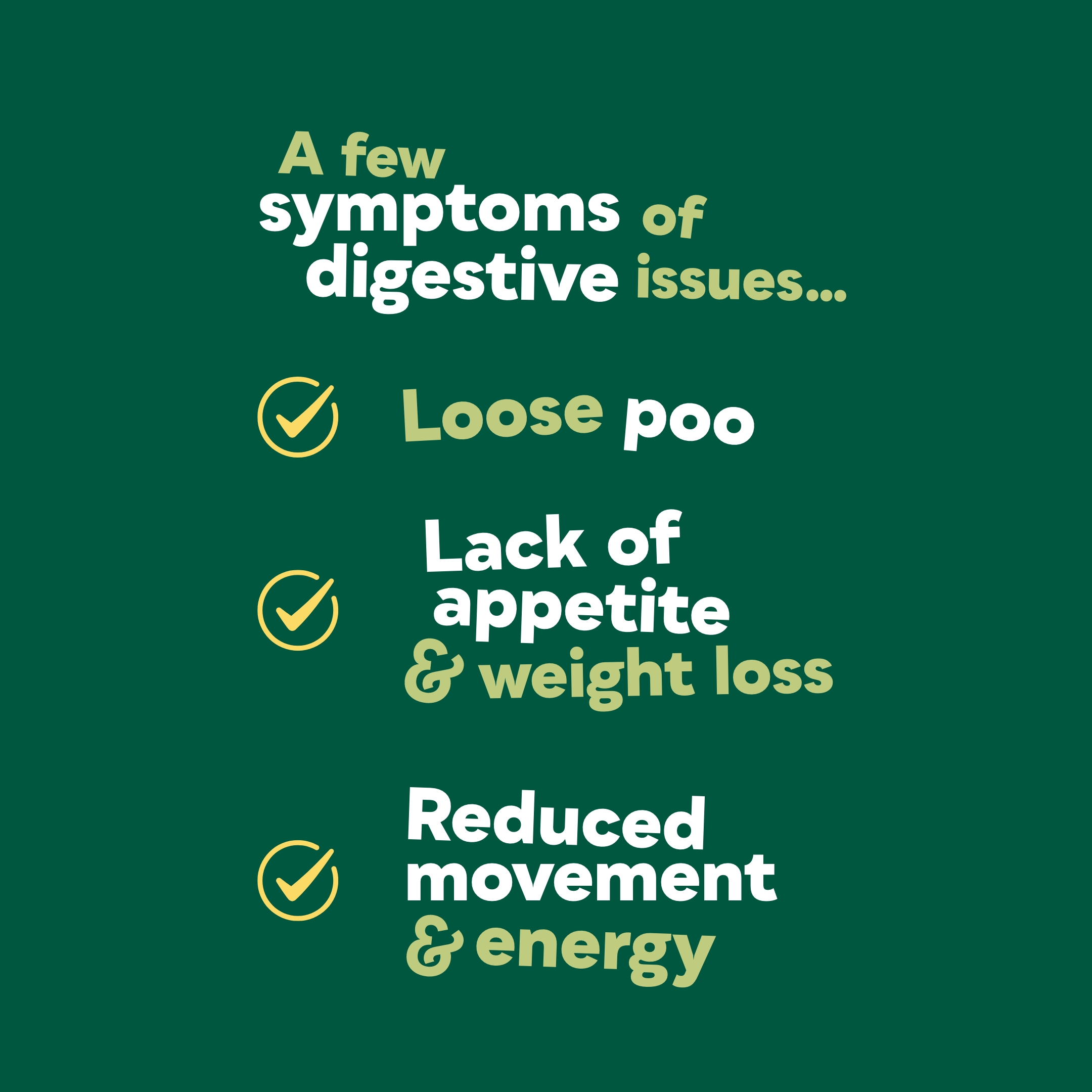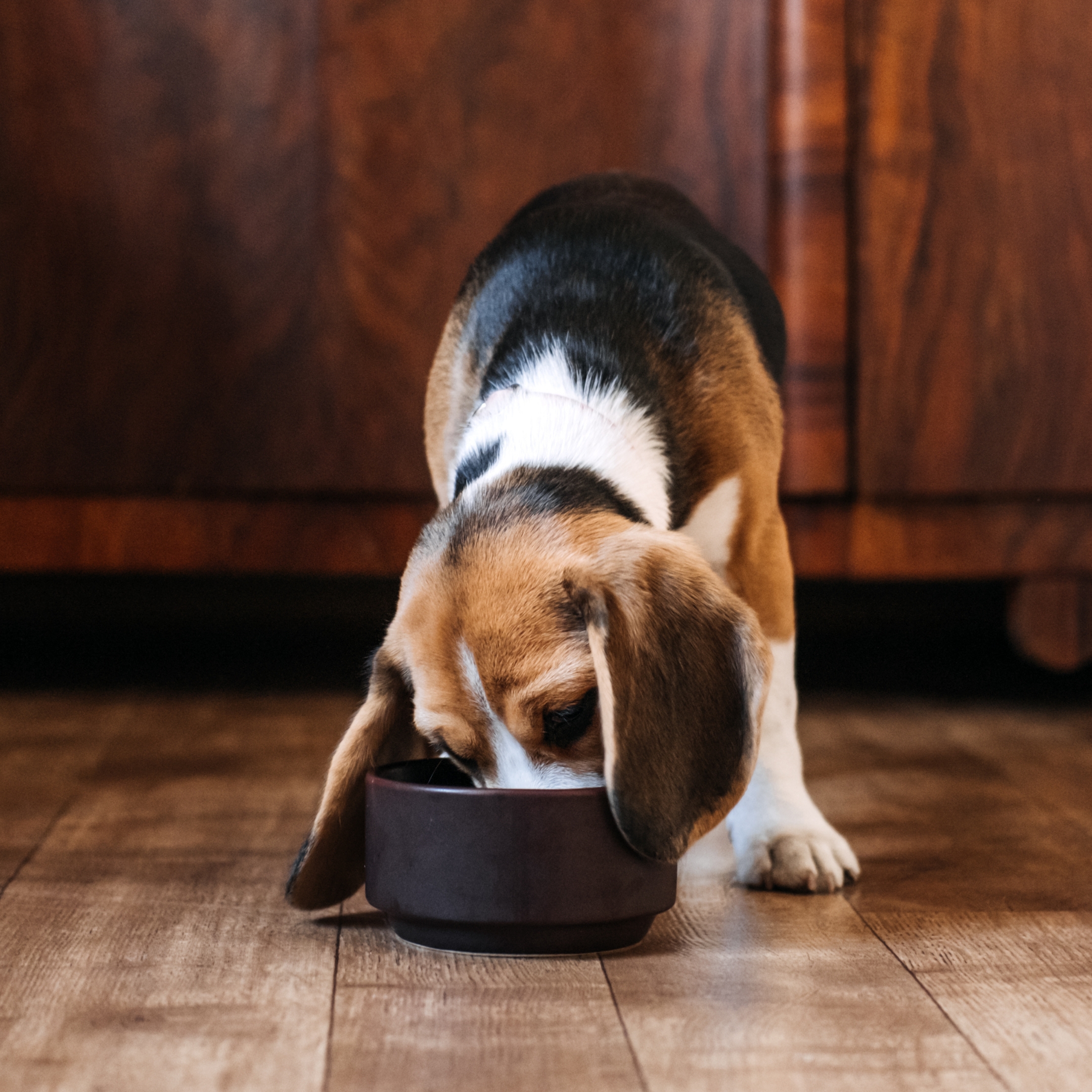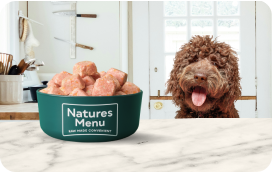YOUR PRACTICAL GUIDE TO THE DOG DIGESTIVE SYSTEM
Table of Contents
Introduction
1. Understanding the dog digestive system
2. Symptoms and causes of dog sensitive stomachs
- Symptoms of dog sensitive stomachs
- Causes of dog sensitive stomachs
- More serious causes of dog sensitive stomachs
3. What’s normal and what’s cause for concern?
4. Foods that are bad for the dog digestive system
5. How to treat dog sensitive stomachs and dog diarrhoea
6. Transitioning dogs to a new food
7. Top 10 dog digestive system tips
8. When to contact the vet
9. FAQs
- My dog is usually fed raw food. If I need to feed a bland diet for a while, what’s suitable?
- If my dog is usually mixed fed a variety of foods, what can I use as a bland diet?
- I’ve heard people talk about different types of blood in poo, what does this mean?
- What do I do if my dog has diarrhoea?
To sum it all up…
Introduction
For dogs, just like humans, health begins in the gut. Good nutrition and digestion are key to longevity, wellbeing, and a strong immune system. The dog digestive system is also how your dog derives nutrition and energy from food and stays hydrated.
Dog sensitive stomachs can happen at any age, with old and small dogs more likely to struggle. How can you make sure your dog’s eating the right diet for them and maintaining the strong digestive system they need to thrive? And when issues with the dog digestive system do crop up, how can you identify and treat the problem?
We’re here to help. Today’s blog is full of practical pointers on how dogs digest food, what upsets dogs’ stomachs, and what you can do to help. Let’s get started…
1. Understanding the dog digestive system
How long does it take a dog to digest food? Digestion is made up of four processes: digestion, absorption of nutrients, movement through the digestive tract (known as motility) and elimination (going to the toilet). Understanding that process can be helpful when dog digestive issues start to appear.
Dogs start to digest food the minute it enters their mouth. Enzymes in their saliva start to break down certain elements of the food eaten and from there, food travels down to their stomach, where gastric juices break it down further.
The partially digested food then moves to the small intestine, where nutrients are absorbed through the intestinal walls into the bloodstream. Being able to absorb those nutrients properly plays an essential part in dogs’ health and wellbeing. Anything they don’t need then moves into the large intestine, where water and electrolytes are absorbed, and poo is formed.
Overall, it takes around 6-8 hours for the dog digestive system to do its job, and for anything your dog has eaten – minus those all-important nutrients – to be passed out again.
 2. Symptoms and causes of dog sensitive stomachs
2. Symptoms and causes of dog sensitive stomachs
Symptoms of dog sensitive stomachs
The dog digestive system, when it isn’t working as it should, can present issues in a lot of different ways. Common symptoms you might spot include:
- Loose poo or diarrhoea.
- Blood in poo.
- Straining to poo or wee.
- Any other changes in consistency, colour, or frequency of poo.
- Lack of appetite and weight loss.
- Nausea (often accompanied by drooling, lip licking or frequent swallowing).
- Vomiting.
- Excessive gas or bloating.
- Reduced movement and energy, especially after eating.
- Whining, pacing and strange body positions such as the ‘praying position'.
Causes of dog sensitive stomachs
Lots of different things can affect the dog digestive system. Some are harmless and temporary, while others can be severe and even potentially life-threatening. It’s important to understand the difference, so you can get your dog the help they need.
Here are some common dog digestive system issues that aren’t usually too much of a concern:
- Overeating. Dogs, like humans, can overindulge. This can cause discomfort and stomach upset as well as dog diarrhoea.
- Hot weather. Lots of dogs eat less when it’s hot. Missing a couple of meals isn’t cause for concern, but it’s a good idea to keep an eye on them.
- Food intolerances and allergies. Some dogs are allergic or intolerant to certain ingredients in food, whether that’s grains or some types of meat. Dogs can also be lactose intolerant to varying degrees. If you think your dog might have an intolerance, talk to your vet. They’ll be able to recommend digestive care dog foods that are appropriate for your pup.
- New food. Transitioning too quickly to a new diet can cause temporary distress to your dog’s digestive system. The good news is, if you take things a bit more slowly, most dogs will adapt to a new diet well. For practical switching advice, try our handy transitioning guide.
- Stress or low immunity. Illness is a common cause of dog sensitive stomachs, particularly in recovery. Talk to your vet if you feel your dog’s struggling to get their appetite back.
- Age. Puppies and older dogs are more prone to upset tummies. Make sure you’re giving them food that’s suitable for their age, like our Natures Menu puppy and senior ranges.
Sometimes, dog sensitive stomachs can also have more serious causes, and need urgent medical attention. If you think your dog’s struggling with one of the following, always call your vet:
- Parasites: In particular worms, which your dog could easily get from eating something they shouldn’t have on a walk.
- Malabsorption issues: When your dog’s digestive system isn’t absorbing nutrients properly, this can often cause fatigue, weight loss and diarrhoea.
- Bacterial infections: Infections can cause dog diarrhoea as well as a host of other symptoms, including fever, shock and gastrointestinal. Dog food may have to be adapted and medication will be required, so talk to your vet.
- Infectious diseases: Your dog may meet another dog who is carrying something contagious.
- Inflammation: Inflammation in dogs, particularly in the digestive tract, rectum and anus can lead to straining when they poo, often causing discomfort, or changes in poo consistency.
- Ulcers or high stomach acid: Ulcers and high stomach acid can be caused by a range of things, including medication, infections, and underlying health conditions. Symptoms may include vomiting and loss of appetite.
- Obstruction: If your dog's eaten something they shouldn’t have, such as a sock or cooked bone, it can block their intestine, and they may struggle to poo. This needs your vet’s attention quickly as it can become dangerous.
- Bloat: This is a condition in which the stomach twists on itself, causing blood flow to be cut off and air to fill the abdominal cavity. It creates a hard, distended tummy in your dog and is a serious emergency. Contact your vet immediately if you suspect it’s happening.
- Poisoning: This can range from mildly toxic (causing discomfort or nausea) to life-threatening. While many house and garden plants can cause a degree of stomach upset, eating raisins, grapes, or antifreeze (which tastes sweet) can be deadly. We’ll talk more about what’s poisonous for dogs in just a moment.
3. What’s normal and what’s cause for concern?
If your dog seems to be having digestive issues, there’s usually no cause for panic. Dogs, like humans, can get a sensitive stomach from time to time and it tends to pass quickly. In these cases, it’s best to feed them something bland and make sure they have plenty of water until their symptoms subside. Even infectious diseases and parasites are quite common and usually easy to treat with the help of your vet, so long as you address them quickly.
However, as we’ve seen, some cases are more serious than others when it comes to the dog digestive system. If your dog is chronically vomiting or passing diarrhoea, has stopped eating, or you notice any major changes to their behaviour (such as incontinence or lack of playfulness), this isn’t normal, and they need expert help.
Frequent dog diarrhoea can cause dehydration and in some extreme cases, shock. Contact your vet as soon as you can so they can treat the underlying reason and, if needed, run diagnostic tests. When in doubt, it’s always good to play it safe and rule out serious issues for your own peace of mind.
4. Foods that are bad for the dog digestive system
You can read our blog on toxic plants, foods and household dangers here, but a quick round-up of toxic ingredients includes: raisins and grapes, many types of nuts, chocolate, tea and coffee, some fruit, garlic and onions, alcohol and caffeine. Other ingredients that often don’t agree with dogs are potatoes, avocados, and cheese. Non-toxic ingredients that may cause digestive upset include high-fibre foods, bread, grains and certain types of meat and veg.
5. How to treat dog sensitive stomachs and dog diarrhoea
Talk to your vet so they can recommend the best treatment plan for your dog. They may run tests, such as taking a blood or stool sample. Usually your dog will be fine, but in some cases, your vet will prescribe tablets such as antibiotics or medication to reduce bloating, or they might recommend you give your dog electrolytes to make sure they stay hydrated.
You might also need to make some changes to their diet. Generally, it’s good to make sure their food is high quality, rich in nutrients and easily digestible, with few filler or artificial ingredients. They’re principles we’re proud to use in all our Natures Menu recipes.
 6. Transitioning dogs to a new food
6. Transitioning dogs to a new food
If you ask us, raw food is a natural, healthy choice for your dog, and making the switch is easier than you might think. In fact, you can read our blog on how to transition your dog here.
But whatever changes you’re making to your dog’s diet – whether you’re going raw or not – we always recommend a 7-day transition period. Divide your dog's daily dinner ration into two portions: one new food and their usual food. Feed each portion ideally 12 hours apart. By day 8 you’ll be able to switch the dog to 100% of the new food. We’ve got a whole advice centre dedicated to raw feeding advice, including transitioning your dog’s food.
7. Top 10 dog digestive system tips
- Always opt for the highest quality food you can find. Our Natures Menu recipes are made with the finest quality ingredients, and we never use anything artificial. You can find out more about our ranges here.
- Keep an eye on your dog’s eating patterns and note any changes in their appetite or poo. Blood in their poo is always a sign to call the vet, and loose, runny poo may also indicate a problem that needs investigating.
- When switching to a new food, do it gradually so your dog has time to adjust.
- Don’t feed dogs human food – it tends to be far too high in fat and salt, and lots of the everyday foods we eat can be poisonous to dogs.
- Remember that certain plants and household items are highly toxic to dogs and avoid leaving them within reach. This blog gives you a complete guide.
- High-fibre items can cause sensitivity if introduced too quickly or fed in large amounts.
- Treats are great but not all treats are created equal. Choose healthy treats, like our Natures Menu superfood bars, and stick to the recommended daily limit.
- When your dog’s off lead, it’s ok to let them sniff but try to stop them picking up or eating any items they find outside.
- When your dog has an upset stomach, stick to bland foods where possible. There’s more on what to choose in our FAQs below.
- Always rule out underlying health issues with your vet and keep your dog’s vaccinations and worm treatments up to date.
8. When to contact the vet
Always seek urgent attention from your vet if you notice dog diarrhoea for more than 24 hours (or 12 hours if they’re very young or old), or if you notice them struggling to stand or wobbling. Other causes for concern are blood in their vomit or poo, or if they can’t keep anything down.
A swollen, hard abdomen could be a sign of bloat. Other signs include your dog finding it difficult to settle and retching without producing any vomit. This is a life-threatening condition that can kill a dog in hours, so call your vet immediately.
9. FAQs
My dog is usually fed raw food. If I need to feed a bland diet for a while, what’s suitable?
For digestive care, dog food with proteins like turkey, chicken, or white fish is what we’d suggest. They’re easily digestible and can be gentle on your dog’s stomach during times of stress.
If my dog is usually mixed fed a variety of foods, what can I use as a bland diet?
At Natures Menu, we’ve got a range of cooked cans and pouches which can be useful when your dog needs a bland, but nutritious and tasty diet. Our Original Chicken with Vegetables pouch could be a great starting point before weaning your dog back over to their normal food.
I’ve heard people talk about different types of blood in poo, what does this mean?
Usually, pet parents will notice straight away when fresh blood is being passed in their dog’s poo. This tends to come from the lower or last part of the digestive tract, such as the large colon or anus, and appears as spots or strands that are usually bright red. If this happens, call your vet for advice. Blood passed down from further back in the dog digestive system, such as from the small intestine or stomach, will look partially digested and have a darker, more black appearance. Again, this might appear as spots or strands in your dog’s poo, or even seem to make up most of their poo. This can be more serious, so see your vet as soon as you can.
What do I do if my dog has diarrhoea?
Many dogs have a bout of diarrhoea just once or twice in a day and then go straight back to normal. Providing your dog is acting, eating, and drinking normally, there’s usually no need to panic. However, if the dog diarrhoea persists or they appear lethargic, in discomfort or have stopped eating, it’s a good idea to make a vet appointment.
To sum it all up…
For dogs and humans alike, immunity starts in the gut. Diet is key to a healthy, happy life for your dog and good nutrition is essential for preventing conditions like diabetes and obesity. It can also help to keep their digestive system healthy, strong, and working properly.
While digestive conditions in dogs are quite common and often easy to treat, think of them as an indicator of your dog’s overall health. For that reason, keeping an eye on their appetite and poo is always important. When in doubt, contact your vet, as certain dog digestive system issues can be a medical emergency or point to an underlying health issue.








 2. Symptoms and causes of dog sensitive stomachs
2. Symptoms and causes of dog sensitive stomachs 6. Transitioning dogs to a new food
6. Transitioning dogs to a new food